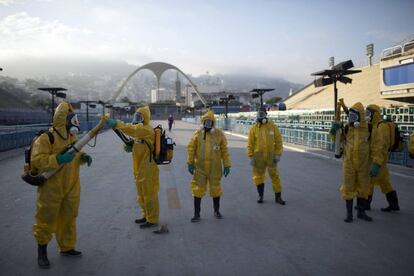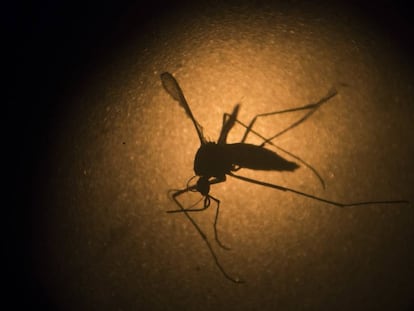“The Games must be postponed: Zika will spread via unexpected channels”
Canadian epidemiologist Amir Attaran is the first signatory of a letter from more than 170 scientists urging the WHO to push back the dates of the Olympics
What are the consequences of holding the Rio Olympic Games while Brazil grapples with the ongoing threat of Zika? According to a joint letter signed by more than 170 scientists and sent to the World Health Organization (WHO), the result could be the possible spread of the disease to unexpected places around the world.

“The clearest consequence is that you increase the risk of spreading the virus and the disease. With half-a-million people going to Rio for the Games – not just the usual visitors but people coming from every corner of the world – you open up the possibility of someone from each one of those places getting infected. Once the individual returns to his country, the local mosquitoes may then transmit the disease,” says Amir Attaran, a professor of epidemiology and public health at the University of Ottawa.
Attaran co-authored the letter that more than 170 scientists have signed and sent to the World Health Organization (WHO) and the International Olympic Committee, urging them to postpone the upcoming Games – scheduled for August 5 to August 21 – until the Zika virus is no longer a threat. The letter also asks the organizations to consider moving the Games to another host country.
With half-a-million people coming from every corner of the world to see the Games in Rio, you open up the possibility of someone from each one of those places getting infected
The WHO has dismissed their concerns and Attaran says the organization is not taking all of the risks into account. “New epidemics could emerge in other places. We must underscore that the virus in Brazil is different from the ones that exist in many other places. That is why we see cases of microcephaly that did not happen with Zika in the same area before this epidemic,” the scientist says.
Thus, the risk is greater for those visitors who come from places where the Brazilian strain of the virus is more likely to spread. “I am not worried, except for sexually transmitted cases, that athletes from Canada or South Africa – just to cite two countries outside the areas where there is the greatest risk – will return to their countries with the virus, because the local mosquitoes of those countries do not transmit the disease. But let’s think for a moment about places such as India or Central Africa, where they could spread it.”
“A significant public health problem”
Lee Igel, one the letter's four authors and a specialist in medical ethics and competitive decision-making at New York University, says "a mega-event in the middle of a huge Zika crisis in a city that faces economic, social, and political challenges, presents a significant public health problem."
The NYU lecturer seems disappointed with the response he and the other signatories received from the World Health Organization. “It’s nothing more than a reaffirmation of what it has been saying. It is not willing to create a transparent, public, open forum so that athletes, visitors and the general public can be conscious of the risks of traveling to Brazil for whoever is going and for the populations of their countries of origin when they return.”
Arthur Caplan, an NYU professor and co-author of the letter, says “WHO is leaning on the fact that the virus has already spread a lot outside of Brazil and therefore it makes no sense to ban travel to Rio, but that reasoning is suspicious because not all strains of the virus are the same in terms of impact.”
The Games will create new infection routes, Attaran says. “How many Ethiopians normally visit Brazil? A lot fewer, of course, than when the Olympics are behind held there. They have to postpone the Games: Zika will spread through unexpected channels.”
Attaran says Brazil’s prevention measures are insufficient and it should wait until the infestation of Aedes aegypti, the mosquito that transmits the virus, is over. “If [the authorities] get it done, and it may only be a question of a few months, they could hold the Games. The problem is that the control measures for the infestation in Brazil have not been successful.” The epidemiologist mentions two previous times when the South American country did eradicate the mosquito: just after World War II and in the late 1990s.
Besides the general threat associated with visiting Rio, the state with the second-largest number of probable Zika cases in Brazil, the poor conditions in Barra da Tijuca, the neighborhood where the Olympic Park is located, complicates the situation. Given the lack of historical data on Zika, the Canadian researcher uses dengue as proxy to make his case. Dengue shares the same transmitter mosquito as Zika. “So far this year, there have been as many cases of dengue in the area as there were in all of 2015.” According to the letter sent to the WHO, cases in Rio in the first quarter of this year increased by 320 percent compared to 2015.
English version by Dyane Jean François.
Sign up for our newsletter
EL PAÍS English Edition has launched a weekly newsletter. Sign up today to receive a selection of our best stories in your inbox every Saturday morning. For full details about how to subscribe, click here.










































